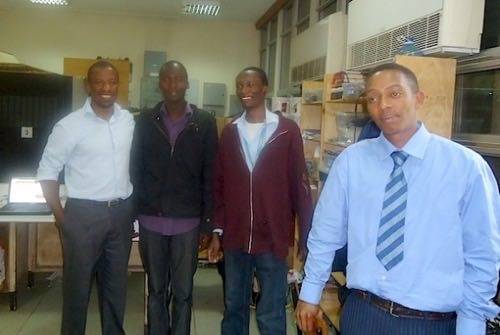It never occured to Simon Mwaura that, just because he wasn’t Bill Gates, he shouldn’t have a house like Bill Gates. So, using scrap metal, cannibalized parts and found wire, he built himself a Xanadu of his own in Nairobi.

The self-taught indie security consultant, who specialized in shop security for small businesses in the Kenyan capital, made his house fully mobile-phone controlled. If someone broke in while he was out, for instance, his house would send an SMS message to the local police. But most important of all his innovations was the tea machine.
When Mr. Mwaura was done with his long day, he could phone his home-made tea machine and the milky water and tea would mix, heat and be ready for him when he walked in the door.
As Dr. Kamau Gachigi, director of the University of Nairobi’s Fab Lab said, “Some day, when Simon is a millionaire, that tea machine will stand proudly in the lobby of his building.”

After seeing Mr. Mwaura’s home on the local TV news (see video below), Gachigi pulled in two of his students and pointed at the paused picture on the screen, showing Mwaura in front of his large, makeshift circuit board, about the size of a kitchen pantry.
“Go to the TV station,” he told them, “and don’t come back without that man.” Now Mwaura has been brought into Fab Lab. With student help, his pantry-sized circuit board is now contained on a single computer chip.
Gachigi heads up the MIT-allied Fab Lab, as well as the University of Nairobi Science and Technology Park. The Fab Lab, like its global counterparts, is one in a network of hands-on high-tech construction facilities, allowing students, faculty and the public to create working prototypes of high-tech, and low-tech, ideas. It also serves as a business incubator and an applied technology, marketing and sales consultancy. The network as a whole is operated according to an open source ethos. Every partner lab is obliged to share new innovations with the network and any lab may build anything another has as a prototype.
“Necessity is the mother of innovation,” said the professor, “and ours is a value-added culture.”
On our tour of the small labs at the U of N’s Engineering School, the professor, who tempers a movie star’s charisma and a religious zealot’s faith with an engineer’s insistence on functionality, paints a picture of a Kenya willing and able to leverage and refine the innate inventiveness of the Kenyan man (or woman) on the streets (or in the fields).
“Necessity is the mother of innovation,” said the professor, “and ours is a value-added culture.”
This “value-added cuture” is so much a part of the Kenyan sense of self that it
has a name in Kiswahili, “jua kali.” (In English, “hot sun.”)
So far the Fab Lab is incubating 17 small companies. One of them was built off of the MIT Media Lab’s innovation, a Wi-Fi amplifier built of locally-sourced materials, in Nairobi’s case, plywood and chicken wire. By bending the plywood in a certain way and attaching chickenwire to the concavity, rebroadcasting towers can be created that extend the reach and power of Internet connectivity.
Dr. Kamau Gachigi, director of the University of Nairobi’s Fab Lab, and staff

The local “estate,” or neighborhood, of Mountainview, has had a 13-month trial serving 10,000 people. Three students manufactured and implemented the system for their senior project. They formed a company to re-sell the Internet connection and the Fab Lab has helped them find seed money and advised them both on the technical and marketing elements. The same system is already in use, as a going concern, upcountry around a store and school complex.
It’s important to remember, and Kenya has reminded me, that technology is not the exclusive domain of eggheads, or even propellerheads. The word itself comes from the Greek for “to make” and making is one of the essential urges of the human spirit.
Don’t worry. I haven’t drank the Kool Aid. There are plenty of obstacles here in Kenya, in the region and on the continent that continue to militate against the success of technology in improving people’s lives and in nudging the human family toward some sort of elemental parity. I will cover those as well, as the series progresses. But finding people with the desire and ability to create, with the insistence on making regardless of the resources available, is not one of those obstacles, as Kamau Gachigi, Simon Mwaura and the Fab Lab demonstrate.
Photo of Mwaura’s tea machine courtesy The Standard, tea cup photo by thesaint, photo of Gachigi and students by Curt Hopkins | Disclosure: the Republic of Kenya provided the reporter’s airfare and hotel.










